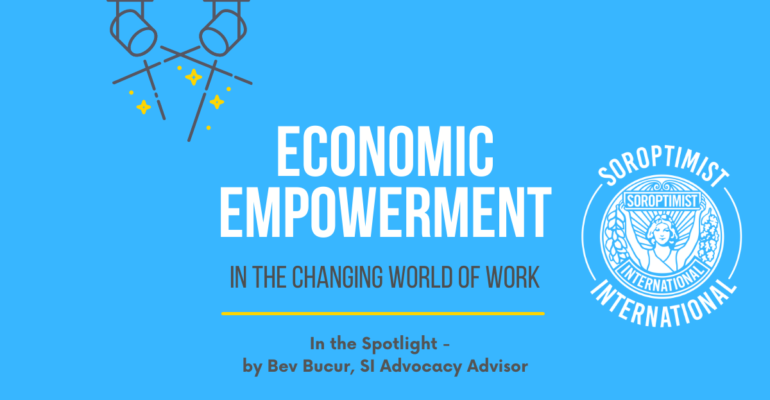Bev Bucur, SI Advocacy Advisor, discusses the review theme for this year’s CSW, ‘Women’s Economic Empowerment in the Changing World of Work’.
“Women’s economic empowerment will be won or lost in the world of work. It will be reflected in whether and how women gain entry into the labour market, and the terms of their engagement in the world of work. Globalisation and technology are changing our understanding of the nature of work. In particular, the digital transformation has changed the world at an unprecedented rate. Artificial intelligence has displaced millions of workers, making once-flourishing industries obsolete. Covid-19 has accelerated the pace of change, showing us the business world we knew just 4 years ago, with physical workplaces, may be a thing of the past. What must be done to meet these challenges?
Education and training at all levels remain transformative tools that enable and empower girls and women throughout the life course. For educational opportunities to translate into sustainable economic outcomes, there must be a joined-up approach across policy areas, ensuring women and girls will be equal participants and leaders in the economic sphere.
Education and training opportunities must be expanded, and additional support given to girls to return to school, and women to return to work and/or education to learn new skills. This is critical after COVID-19, as during the pandemic, financial pressures and caring responsibilities meant that many girls and women left education, training and work. Scholarships, informal education, retraining opportunities, and other programmes all promote women’s economic empowerment. New educational and training opportunities must ensure girls and women are equipped and qualified for work with new technologies, STEM and in green economies.
Workplaces must become more inclusive by hiring diverse employees, addressing implicit and explicit biases including gender biases, improving accessibility, eradicating workplace violence and harassment, facilitating flexible working practices, making work environments safer, paying a living wage, equal pay for work of equal value, and offering opportunities and support for advancement, including training opportunities.
Women earning less throughout their career creates a gender pension gap, leaving older women at increased risks of poverty. With women living longer, they lack the financial resources to last their lifetime and cannot retire at a time of their choosing. Immediate steps must be taken to rectify these issues. Introducing new business policies and practices, including the introduction of quotas, will have a vital role to play in diversifying workplaces. States’ introduction and enforcement of national and international legislation can accelerate progress; legal protections to ensure that workplaces put employees first must be implemented.
Women in all their diversity must be free to make their own choices on careers, having children, work-life balance, or getting involved as leaders in their communities. Unfortunately, workplace policies and practices greatly impact how people, and particularly women, make those choices. Workplace policies must be flexible, adaptable and accessible to maximise options for women.
What can Soroptimists do?
Our local work can have a transformative effect. Programmes such as the SIA Dream It Be It, Career Support for Girls, SIE and SIFA Leadership Academies, help girls and young women understand the possibilities and plan for their futures. Mentoring programmes help to increase confidence, self awareness, exposure to new and different ideas, encourage goal setting and develop communication skills. Scholarships and monetary awards help girls and women meet the challenges of obtaining an education. Finally, advocating at the local, national and international level is essential to creating an educational system that that is fair, equitable and violence free will ensure that no one is left behind.”
For more information regarding Soroptimist International’s position, please see our paper on the Economic Empowerment of Women and Girls and our statement for the Commission on Population and Development 55th Session.


good article!